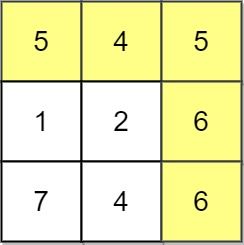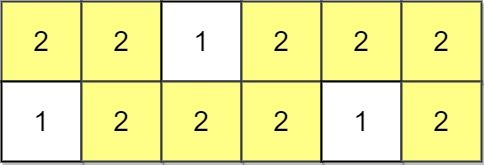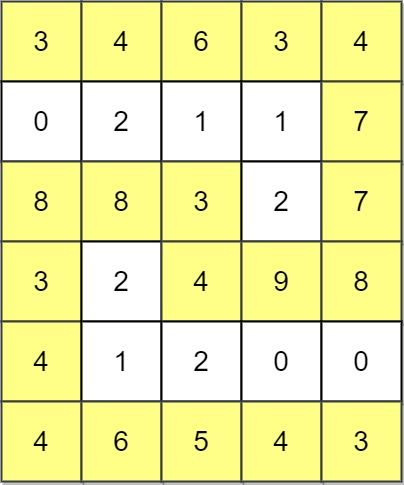| comments | difficulty | edit_url | rating | source | tags | |||||||
|---|---|---|---|---|---|---|---|---|---|---|---|---|
true |
Medium |
2011 |
Biweekly Contest 3 Q4 |
|
Given an m x n integer matrix grid, return the maximum score of a path starting at (0, 0) and ending at (m - 1, n - 1) moving in the 4 cardinal directions.
The score of a path is the minimum value in that path.
- For example, the score of the path
8 → 4 → 5 → 9is4.
Example 1:
Input: grid = [[5,4,5],[1,2,6],[7,4,6]] Output: 4 Explanation: The path with the maximum score is highlighted in yellow.
Example 2:
Input: grid = [[2,2,1,2,2,2],[1,2,2,2,1,2]] Output: 2
Example 3:
Input: grid = [[3,4,6,3,4],[0,2,1,1,7],[8,8,3,2,7],[3,2,4,9,8],[4,1,2,0,0],[4,6,5,4,3]] Output: 3
Constraints:
m == grid.lengthn == grid[i].length1 <= m, n <= 1000 <= grid[i][j] <= 109
First, we construct a triplet
Next, we take out the triplets from
The time complexity is
class Solution:
def maximumMinimumPath(self, grid: List[List[int]]) -> int:
def find(x: int) -> int:
if p[x] != x:
p[x] = find(p[x])
return p[x]
m, n = len(grid), len(grid[0])
p = list(range(m * n))
q = [(v, i, j) for i, row in enumerate(grid) for j, v in enumerate(row)]
q.sort()
ans = 0
dirs = (-1, 0, 1, 0, -1)
vis = set()
while find(0) != find(m * n - 1):
v, i, j = q.pop()
ans = v
vis.add((i, j))
for a, b in pairwise(dirs):
x, y = i + a, j + b
if (x, y) in vis:
p[find(i * n + j)] = find(x * n + y)
return ansclass Solution {
private int[] p;
public int maximumMinimumPath(int[][] grid) {
int m = grid.length, n = grid[0].length;
p = new int[m * n];
List<int[]> q = new ArrayList<>();
for (int i = 0; i < m; ++i) {
for (int j = 0; j < n; ++j) {
q.add(new int[] {grid[i][j], i, j});
p[i * n + j] = i * n + j;
}
}
q.sort((a, b) -> b[0] - a[0]);
boolean[][] vis = new boolean[m][n];
int[] dirs = {-1, 0, 1, 0, -1};
int ans = 0;
for (int i = 0; find(0) != find(m * n - 1); ++i) {
int[] t = q.get(i);
vis[t[1]][t[2]] = true;
ans = t[0];
for (int k = 0; k < 4; ++k) {
int x = t[1] + dirs[k], y = t[2] + dirs[k + 1];
if (x >= 0 && x < m && y >= 0 && y < n && vis[x][y]) {
p[find(x * n + y)] = find(t[1] * n + t[2]);
}
}
}
return ans;
}
private int find(int x) {
if (p[x] != x) {
p[x] = find(p[x]);
}
return p[x];
}
}class Solution {
public:
int maximumMinimumPath(vector<vector<int>>& grid) {
int m = grid.size(), n = grid[0].size();
vector<tuple<int, int, int>> q;
vector<int> p(m * n);
iota(p.begin(), p.end(), 0);
for (int i = 0; i < m; ++i) {
for (int j = 0; j < n; ++j) {
q.emplace_back(grid[i][j], i, j);
}
}
function<int(int)> find = [&](int x) {
return p[x] == x ? x : p[x] = find(p[x]);
};
sort(q.begin(), q.end(), greater<tuple<int, int, int>>());
int ans = 0;
int dirs[5] = {-1, 0, 1, 0, -1};
bool vis[m][n];
memset(vis, false, sizeof(vis));
for (auto& [v, i, j] : q) {
vis[i][j] = true;
ans = v;
for (int k = 0; k < 4; ++k) {
int x = i + dirs[k], y = j + dirs[k + 1];
if (x >= 0 && x < m && y >= 0 && y < n && vis[x][y]) {
p[find(x * n + y)] = find(i * n + j);
}
}
if (find(0) == find(m * n - 1)) {
break;
}
}
return ans;
}
};func maximumMinimumPath(grid [][]int) (ans int) {
m, n := len(grid), len(grid[0])
p := make([]int, m*n)
vis := make([][]bool, m)
q := [][3]int{}
for i, row := range grid {
vis[i] = make([]bool, n)
for j, v := range row {
p[i*n+j] = i*n + j
q = append(q, [3]int{v, i, j})
}
}
sort.Slice(q, func(i, j int) bool { return q[i][0] > q[j][0] })
var find func(int) int
find = func(x int) int {
if p[x] != x {
p[x] = find(p[x])
}
return p[x]
}
dirs := [5]int{-1, 0, 1, 0, -1}
for _, t := range q {
v, i, j := t[0], t[1], t[2]
ans = v
vis[i][j] = true
for k := 0; k < 4; k++ {
x, y := i+dirs[k], j+dirs[k+1]
if 0 <= x && x < m && 0 <= y && y < n && vis[x][y] {
p[find(x*n+y)] = find(i*n + j)
}
}
if find(0) == find(m*n-1) {
break
}
}
return
}function maximumMinimumPath(grid: number[][]): number {
const m = grid.length;
const n = grid[0].length;
const p: number[] = Array(m * n)
.fill(0)
.map((_, i) => i);
const q: number[][] = [];
for (let i = 0; i < m; ++i) {
for (let j = 0; j < n; ++j) {
q.push([grid[i][j], i, j]);
}
}
q.sort((a, b) => b[0] - a[0]);
const find = (x: number): number => {
if (p[x] !== x) {
p[x] = find(p[x]);
}
return p[x];
};
const dirs: number[] = [-1, 0, 1, 0, -1];
const vis: boolean[][] = Array(m)
.fill(0)
.map(() => Array(n).fill(false));
let ans = 0;
for (let k = 0; find(0) !== find(m * n - 1); ++k) {
const [t, i, j] = q[k];
ans = t;
vis[i][j] = true;
for (let d = 0; d < 4; ++d) {
const [x, y] = [i + dirs[d], j + dirs[d + 1]];
if (x >= 0 && x < m && y >= 0 && y < n && vis[x][y]) {
p[find(i * n + j)] = find(x * n + y);
}
}
}
return ans;
}struct UnionFind {
p: Vec<usize>,
size: Vec<usize>,
}
impl UnionFind {
fn new(n: usize) -> Self {
let p: Vec<usize> = (0..n).collect();
let size = vec![1; n];
UnionFind { p, size }
}
fn find(&mut self, x: usize) -> usize {
if self.p[x] != x {
self.p[x] = self.find(self.p[x]);
}
self.p[x]
}
fn union(&mut self, a: usize, b: usize) {
let pa = self.find(a);
let pb = self.find(b);
if pa != pb {
if self.size[pa] > self.size[pb] {
self.p[pb] = pa;
self.size[pa] += self.size[pb];
} else {
self.p[pa] = pb;
self.size[pb] += self.size[pa];
}
}
}
}
impl Solution {
pub fn maximum_minimum_path(grid: Vec<Vec<i32>>) -> i32 {
let m = grid.len();
let n = grid[0].len();
let mut uf = UnionFind::new(m * n);
let mut q: Vec<Vec<i32>> = Vec::new();
for i in 0..m {
for j in 0..n {
q.push(vec![grid[i][j], i as i32, j as i32]);
}
}
q.sort_by(|a, b| b[0].cmp(&a[0]));
let mut vis: Vec<Vec<bool>> = vec![vec![false; n]; m];
let dirs: [i32; 5] = [-1, 0, 1, 0, -1];
let mut ans = 0;
for k in 0..q.len() {
if uf.find(0) == uf.find(m * n - 1) {
break;
}
let t = &q[k];
let (v, i, j) = (t[0], t[1] as usize, t[2] as usize);
ans = v;
vis[i][j] = true;
for d in 0..4 {
let x = (i as i32) + dirs[d];
let y = (j as i32) + dirs[d + 1];
if x >= 0
&& x < (m as i32)
&& y >= 0
&& y < (n as i32)
&& vis[x as usize][y as usize]
{
uf.union((x as usize) * n + (y as usize), i * n + j);
}
}
}
ans
}
}class UnionFind:
__slots__ = ("p", "size")
def __init__(self, n):
self.p = list(range(n))
self.size = [1] * n
def find(self, x: int) -> int:
if self.p[x] != x:
self.p[x] = self.find(self.p[x])
return self.p[x]
def union(self, a: int, b: int) -> bool:
pa, pb = self.find(a), self.find(b)
if pa == pb:
return False
if self.size[pa] > self.size[pb]:
self.p[pb] = pa
self.size[pa] += self.size[pb]
else:
self.p[pa] = pb
self.size[pb] += self.size[pa]
return True
class Solution:
def maximumMinimumPath(self, grid: List[List[int]]) -> int:
m, n = len(grid), len(grid[0])
uf = UnionFind(m * n)
q = [(v, i, j) for i, row in enumerate(grid) for j, v in enumerate(row)]
q.sort()
ans = 0
vis = set()
dirs = (-1, 0, 1, 0, -1)
while uf.find(0) != uf.find(m * n - 1):
v, i, j = q.pop()
ans = v
vis.add((i, j))
for a, b in pairwise(dirs):
x, y = i + a, j + b
if (x, y) in vis:
uf.union(x * n + y, i * n + j)
return ansclass UnionFind {
private int[] p;
private int[] size;
public UnionFind(int n) {
p = new int[n];
size = new int[n];
for (int i = 0; i < n; ++i) {
p[i] = i;
size[i] = 1;
}
}
public int find(int x) {
if (p[x] != x) {
p[x] = find(p[x]);
}
return p[x];
}
public void union(int a, int b) {
int pa = find(a), pb = find(b);
if (pa != pb) {
if (size[pa] > size[pb]) {
p[pb] = pa;
size[pa] += size[pb];
} else {
p[pa] = pb;
size[pb] += size[pa];
}
}
}
}
class Solution {
public int maximumMinimumPath(int[][] grid) {
int m = grid.length, n = grid[0].length;
UnionFind uf = new UnionFind(m * n);
List<int[]> q = new ArrayList<>();
for (int i = 0; i < m; ++i) {
for (int j = 0; j < n; ++j) {
q.add(new int[] {grid[i][j], i, j});
}
}
q.sort((a, b) -> b[0] - a[0]);
boolean[][] vis = new boolean[m][n];
int[] dirs = {-1, 0, 1, 0, -1};
int ans = 0;
for (int i = 0; uf.find(0) != uf.find(m * n - 1); ++i) {
int[] t = q.get(i);
vis[t[1]][t[2]] = true;
ans = t[0];
for (int k = 0; k < 4; ++k) {
int x = t[1] + dirs[k], y = t[2] + dirs[k + 1];
if (x >= 0 && x < m && y >= 0 && y < n && vis[x][y]) {
uf.union(x * n + y, t[1] * n + t[2]);
}
}
}
return ans;
}
}class UnionFind {
public:
UnionFind(int n) {
p = vector<int>(n);
size = vector<int>(n, 1);
iota(p.begin(), p.end(), 0);
}
void unite(int a, int b) {
int pa = find(a), pb = find(b);
if (pa != pb) {
if (size[pa] > size[pb]) {
p[pb] = pa;
size[pa] += size[pb];
} else {
p[pa] = pb;
size[pb] += size[pa];
}
}
}
int find(int x) {
if (p[x] != x) {
p[x] = find(p[x]);
}
return p[x];
}
private:
vector<int> p, size;
};
class Solution {
public:
int maximumMinimumPath(vector<vector<int>>& grid) {
int m = grid.size(), n = grid[0].size();
vector<tuple<int, int, int>> q;
UnionFind uf(m * n);
for (int i = 0; i < m; ++i) {
for (int j = 0; j < n; ++j) {
q.emplace_back(grid[i][j], i, j);
}
}
sort(q.begin(), q.end(), greater<tuple<int, int, int>>());
int ans = 0;
int dirs[5] = {-1, 0, 1, 0, -1};
bool vis[m][n];
memset(vis, false, sizeof(vis));
for (auto& [v, i, j] : q) {
vis[i][j] = true;
ans = v;
for (int k = 0; k < 4; ++k) {
int x = i + dirs[k], y = j + dirs[k + 1];
if (x >= 0 && x < m && y >= 0 && y < n && vis[x][y]) {
uf.unite(x * n + y, i * n + j);
}
}
if (uf.find(0) == uf.find(m * n - 1)) {
break;
}
}
return ans;
}
};type unionFind struct {
p, size []int
}
func newUnionFind(n int) *unionFind {
p := make([]int, n)
size := make([]int, n)
for i := range p {
p[i] = i
size[i] = 1
}
return &unionFind{p, size}
}
func (uf *unionFind) find(x int) int {
if uf.p[x] != x {
uf.p[x] = uf.find(uf.p[x])
}
return uf.p[x]
}
func (uf *unionFind) union(a, b int) {
pa, pb := uf.find(a), uf.find(b)
if pa != pb {
if uf.size[pa] > uf.size[pb] {
uf.p[pb] = pa
uf.size[pa] += uf.size[pb]
} else {
uf.p[pa] = pb
uf.size[pb] += uf.size[pa]
}
}
}
func maximumMinimumPath(grid [][]int) (ans int) {
m, n := len(grid), len(grid[0])
uf := newUnionFind(m * n)
vis := make([][]bool, m)
q := [][3]int{}
for i, row := range grid {
vis[i] = make([]bool, n)
for j, v := range row {
q = append(q, [3]int{v, i, j})
}
}
sort.Slice(q, func(i, j int) bool { return q[i][0] > q[j][0] })
dirs := [5]int{-1, 0, 1, 0, -1}
for _, t := range q {
v, i, j := t[0], t[1], t[2]
ans = v
vis[i][j] = true
for k := 0; k < 4; k++ {
x, y := i+dirs[k], j+dirs[k+1]
if 0 <= x && x < m && 0 <= y && y < n && vis[x][y] {
uf.union(x*n+y, i*n+j)
}
}
if uf.find(0) == uf.find(m*n-1) {
break
}
}
return
}class UnionFind {
private p: number[];
private size: number[];
constructor(n: number) {
this.p = Array(n)
.fill(0)
.map((_, i) => i);
this.size = Array(n).fill(1);
}
find(x: number): number {
if (this.p[x] !== x) {
this.p[x] = this.find(this.p[x]);
}
return this.p[x];
}
union(a: number, b: number): boolean {
const pa = this.find(a);
const pb = this.find(b);
if (pa === pb) {
return false;
}
if (this.size[pa] > this.size[pb]) {
this.p[pb] = pa;
this.size[pa] += this.size[pb];
} else {
this.p[pa] = pb;
this.size[pb] += this.size[pa];
}
return true;
}
}
function maximumMinimumPath(grid: number[][]): number {
const m = grid.length;
const n = grid[0].length;
const q: number[][] = [];
for (let i = 0; i < m; ++i) {
for (let j = 0; j < n; ++j) {
q.push([grid[i][j], i, j]);
}
}
q.sort((a, b) => b[0] - a[0]);
const dirs: number[] = [-1, 0, 1, 0, -1];
const vis: boolean[][] = Array(m)
.fill(0)
.map(() => Array(n).fill(false));
let ans = 0;
const uf = new UnionFind(m * n);
for (let k = 0; uf.find(0) !== uf.find(m * n - 1); ++k) {
const [t, i, j] = q[k];
ans = t;
vis[i][j] = true;
for (let d = 0; d < 4; ++d) {
const [x, y] = [i + dirs[d], j + dirs[d + 1]];
if (x >= 0 && x < m && y >= 0 && y < n && vis[x][y]) {
uf.union(i * n + j, x * n + y);
}
}
}
return ans;
}

